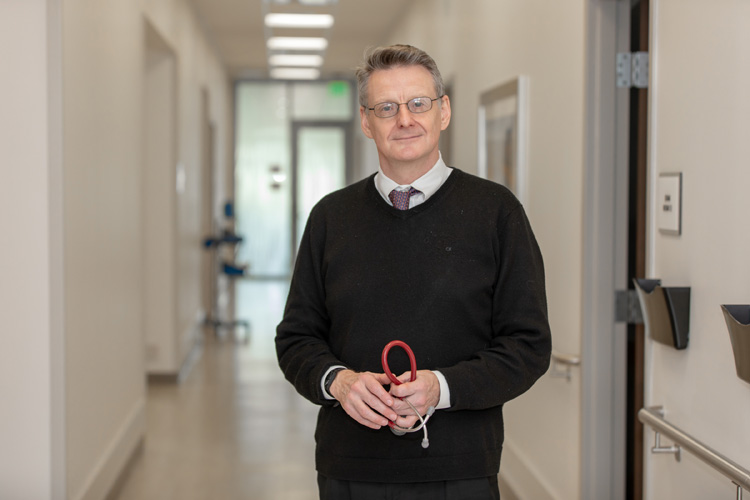
Dr. Alan Grosset, who joined the staff at the Scully-Welsh Cancer Center in September, has a pair of specialties – medical oncology and hematology – that make him a valuable hybrid cancer expert to have onboard.
As the Mayo clinic explains, oncologist-hematologists “do not usually treat operable cancers such as prostate cancer but specialize, instead, in treating blood cancers such as Hodgkin’s and non-Hodgkin’s lymphomas, leukemias and multiple myelomas,” and in the management and treatment of solid tumors.
While the conditions he treats are dire, Grosset has a steady stream of new drugs to help him help his patients. In 2018 alone more than 60 hematology/oncology drugs were either newly approved or cleared for treating cancers other than the ones they were initially designed to treat.
Grosset sits back and marvels as he says, “There are a lot of new drugs, aren’t there? In the last three years, I think it’s kind of a record. The ones that I use more often than others are things like pembrolizumab and nivolumab.”
Nivolumab, or Opdivo, is used to treat patients with un-resectable or metastatic melanomas as well as metastatic squamous, non-small-cell lung cancer. while Pembrolizumab is most commonly used on advanced melanomas.
But there are many more tools in Grosset’s toolbox. A class of drugs called biologics is one of the newest forms of medication used to treat the cancers he deals with.
“Biological therapy,” says the Dana Farber Cancer Institute, “uses living organisms, substances derived from organisms, or laboratory-made versions of those substances to act against cancer cells,” and it has become a burgeoning business for pharmaceutical companies.
Why? Because while traditional chemotherapy drugs work by destroying cancer cells directly, they also destroy normal healthy cells in the process and often produce decidedly unpleasant side effects including nausea, fatigue, hair loss and other complications.
Biotherapies work by attacking specific tumor cells directly or by stimulating the patients’ own immune system to target only the cancer.
As a result, the Mayo Clinic states that biotherapies “cause fewer toxic side effects,” and new biotherapy drugs are hitting the market at breakneck speed.
“I think it’s really interesting that we’ve got so many different classes of drugs now,” says Grosset. “Everybody talks about the [biologic and immunotherapy] drugs, but you might not know that there are also things called ‘hedgehog inhibitors.’”
Unlike the small, spiny mammal, the hedgehog Grosset is referring to is “a biological pathway,” and by blocking or inhibiting cancer cells’ access to that pathway, hedgehog inhibitors have proven highly effective in treating both metastatic basal-cell carcinomas (skin cancer) and as well as leukemia.
Asked if the current flood tide of new cancer drugs is likely to slow down or even narrow any time in the near future, Grosset offers an emphatic response: “No,” he states flatly, “it’s working the opposite way.”
Given that the National Center for Biotechnology Information at the National Institutes of Health says there are over 100 distinct types of cancer which “can vary substantially in their behavior and response to treatment,” the financial incentive for developing more and more specialized cancer drugs is substantial.
There is, however, at least some bad news about this new generation of cancer drugs. Many are extremely expensive and relatively few have any generic – or what the FDA calls “bio-similar” – competition.
Both cancer and treatments for it are complex, but Grosset says he has been impressed during his first five months in Vero Beach with his patients’ willingness and ability to do some pretty thorough research on their own.
“That’s definitely a help,” says Grosset, “because we’re here to leverage people to get up to where they need to get to, and if they’re doing some of their own work, it’s always appreciated. Some of the materials that people bring in are very high quality and very useful. There is,” he says, “every reason in the world to go and read about your own medications or your own illness.”
Dr. Alan Grosset is with the Scully Welsh Cancer Center in Vero Beach. His office is at 3555 10th Court. The phone number is 772-226-4810.



